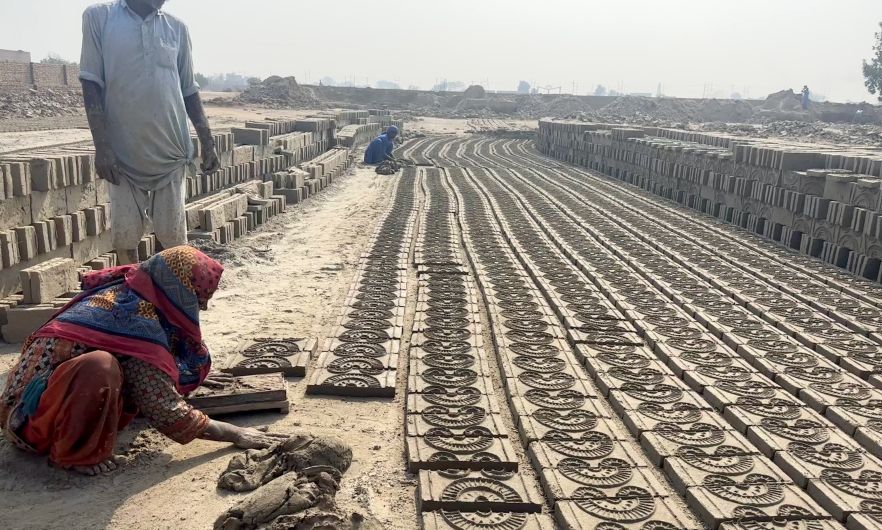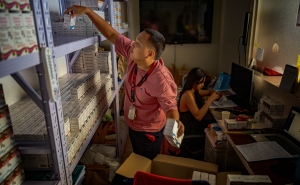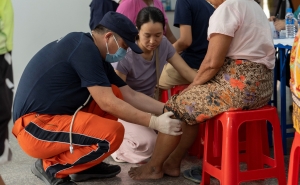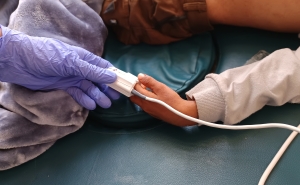Looking at Forced Labor from a Global Health Perspective
Researchers Aim to Address Health and Socioeconomic Risks of Forced Labor for Workers in Nepal and Pakistan.

Photo credit: Sani Fatima, MPH Candidate, Johns Hopkins Bloomberg School of Public Health
Researchers in the Johns Hopkins Bloomberg School of Public Health received two new grants from the U.S. Department of State Office to Monitor and Combat Trafficking in Persons to examine the health and safety risks of forced labor on workers and their communities. One grant will be conducted in Nepal, looking at the migration process for migrant workers from Nepal to destination countries in the Middle East and Asia, and the other will be conducted in Pakistan, examining the occupational health and safety impacts for laborers in the brick kiln industry.
Both grants are led by W. Courtland Robinson, PhD, associate professor in the Department of International Health at the Bloomberg School. Other Johns Hopkins faculty working on the projects include Dinesh Neupane, PhD, MSc, assistant scientist and Syeda Mahnoor Rizvi, MSPH ’22, research associate, in the Department of International Health.
Both projects emphasize taking a global health approach when examining human trafficking and forced labor, issues that are often seen primarily from a human rights lens. “There are immediate health risks for people who are trafficked into work,” says Robinson. “They are often trafficked into dangerous types of work and are exposed to injuries, working in extreme heat conditions, and often doing heavy labor that puts them into positions where they are more likely to be hurt and suffer health conditions.”
These types of workers are more likely to experience injury, illness, and death, while at the same time lack the means to seek treatment and are vulnerable to exploitation due to their undocumented status. There is also a mental health burden because they experience psychological threats, physical abuse, and coercion.
The grant in Nepal, which will also potentially be expanded to other countries if circumstances permit, is part of a $4 million, four-year project, led by La Isla Network, in collaboration with the Nepal Development Society and Bournemouth University to examine the process of migration for laborers from Nepal who go to destination countries for temporary work due to a shortage of opportunities in their home country. Researchers will explore ideas for implementing and pilot testing a scalable health intervention that seeks to support migrant workers at various stages of their journey, from pre-departure to work in destination countries and upon return to Nepal. The focus will be on improving access to care and services at different stages in the migration journey, focusing on occupational health and safety, but also on addressing labor rights and social protection concerns.
Due to deceptive recruitment practices, sometimes the migrant’s work in the destination country is not what was portrayed to them, and they end up being the victims of trafficking. This could take the form of exploitative recruiter fees, contract substitution, lack of freedom of movement, lack of grievance mechanisms, withholding of wages, and strenuous labor in treacherous environments. These experiences often lead to poor health outcomes, such as illness, injury, and even death.
“Every day Nepali migrant workers are losing their lives abroad and the arrival of their coffins has tragically become an all-too-familiar occurrence at Nepal’s Tribhuvan International Airport. Hundreds of thousands of Nepali migrant workers fall victim to trafficking each year, leading to dire outcomes such as illness, injury, and even death. The drive to prevent these entirely avoidable deaths and disabilities has always been close to my heart,” says Neupane, co-lead on the Nepal project.
The grant in Pakistan is a three-year, $2 million extension of an existing study on forced labor in the brick kiln industry, where Johns Hopkins researchers will work in collaboration with Aga Khan University and the Society for the Protection of the Rights of the Child, a Pakistan-based non-profit to evaluate an intervention package that provides legal aid as well as support and access to health and education services to workers.
Brick kiln workers are often forced into labor due to debt bondage, where they are given high-interest loans or cash advances in exchange for long-term labor. Since the informal brick kiln sector is not monitored, brick kiln workers are often unregistered and therefore vulnerable to exploitation and cannot access health and social services that formal workers can, such as cash for sickness, injury benefits, maternity benefits, disability pensions, and survivor benefits.
“We want to look at the public health dimensions of forced labor, since we know how to apply skills like intervention research design, rigorous monitoring and evaluations, and thorough analysis to get better data and build an evidence base to inform more effective policies and programs,” emphasizes Robinson.




